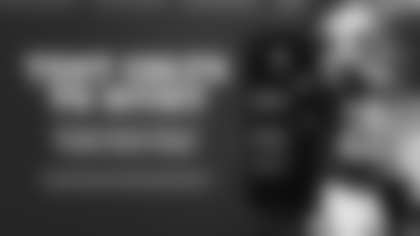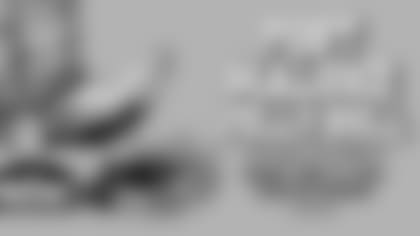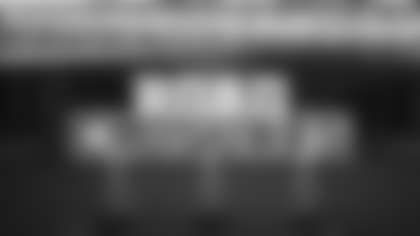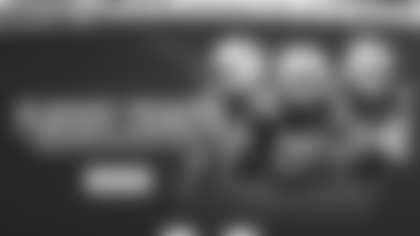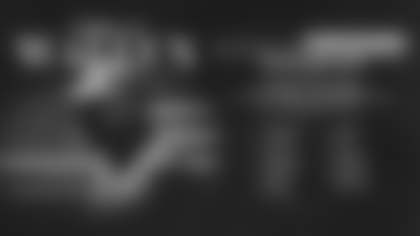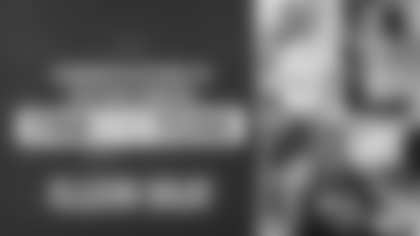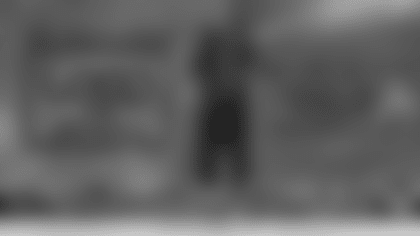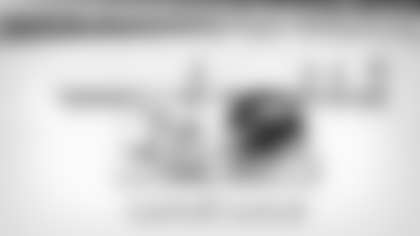Q: An 18-14 victory over the San Francisco 49ers on Sunday.
After four consecutive one-sided victories, this one was close, but
close games are usually the norm in the NFL.
A. That's true. We're just not used to having those types of games, at least not recently anyway. It was somewhat interesting when you looked at the tape and then listened to the coaches in our meeting Monday afternoon. On offense, we missed some big opportunities early that we had planned for and hoped to get, which certainly would have changed the complete complexion of the game. (Colts wide receiver) Reggie (Wayne) not being 100 percent, we had some timing issues there. (Quarterback) Peyton (Manning) couldn't quite get his feet under him on the throw to (wide receiver) Pierre (Garcon), which would have been a touchdown had he been able to get the ball out there. Then, in the run game, we were somewhat careless in technique and execution. As a result, we didn't execute in the first half in the run game as well as we should have. Our ball security was a little bit less than we would have liked, particularly in the passing game. The ball was on the ground a little bit too much. We picked it up in the second half to the point where we ran the ball very well. We actually had a five-minute drive at the end of the game, not four-minute. We practice for four-minute, but we controlled the ball for five minutes and never let them have it back. We ended up using up all of the clock and finishing the game out, which was a point of emphasis for us in the offseason. We didn't have a turnover, which was critically important in a game of that nature, when you play a game that close to the vest. That was their m.o. That was what they wanted to do. That's how they wanted the game played. Our missed opportunities for the big plays early allowed them to play that way. Defensively, we stopped them except for the one play, which was an entry error on the part of two players. We again on third down stopped them on eight out of 10. We had a penalty where we would have had them backed up – an offside penalty, which was just, again, careless. We allowed a touchdown in two-minute, which should not have happened. We gave them the long run, which should not have happened. Having said that, we ended up clamping down in the second half, shutting down the run and getting big sacks that effectively ended the game for all intents and purposes, despite the fact that they didn't want to play that way. We felt good about that. And as (Colts Head Coach) Jim (Caldwell) said, 'We're entering a phase now traditionally from Week 8 to 12 where our injuries spike. That has been true over the last seven years, and there's no reason to think it won't be true now. Having said that, you still have to get better. Good teams get better at this point. Poor teams do not. It's our job to get better, to improve on what we can improve on – which is plenty, based on Sunday's performance. Now, we face a stretch of four games – Houston, New England, Baltimore, Houston again that can go a long way to determining what kind of a season we have. The most important one is the next one, Houston, and probably more important than any of the following three – except for the rematch in Houston because it's a division game. We need to get better and to improve on the things we need to improve on. There's plenty to do that, and fortunately we're still undefeated. This is the kind of performance coaches like, because you won – and the players like it because you got a Victory Monday, and they're off – but there's plenty to correct. We'll go about doing that.
Q: Can you talk about the clock-management strategy at the end of the game for the Colts?
A: The whole theory of what we call four-minute offense is that inside four minutes left in the game what you want to do is basically get two first downs depending on how many times out your opponent has. They had two. If they have all three, you might have to get three first downs depending upon how the clock is managed. For sure, you have to get two. You want to do that running the ball, or you want to do it with the clock running. You don't want an incomplete pass, and you certainly don't want a turnover. You want them to use their times out and you want to control the clock and the game at that point, and not give them back the ball if you can avoid it. What happened was we were able to do that. We didn't do it totally running. We had some nice passes mixed in there, possession passes, but nevertheless we controlled the ball and made them use every time out. (Running back) Joseph (Addai) really ran the ball well in that situation – downhill, getting every last yard. Then, with very little time remaining on the clock, Jim elected to let the clock go all the way down, both the 40-second clock and the game clock. I believe it was six seconds. We took our timeout with one second left on the play clock. It was fourth down. You try for it and if you make it, the game is over. If you don't, the clock stops on a change of possession probably with one second left, so they have a chance to throw a one-second Hail Mary from inside their 20-yard line. It was absolutely the right way to manage the clock. It was perfect and on top of that, we made the first down, so the game ended and away we go.
Q: Were there a lot of changes at halftime, particularly in the area of run defense?
A: No. Everybody was just getting in their gap and taking people on and doing what they had to do. Actually, the run that got out for a touchdown, the tackles did a heck of a job. They stuffed it up. We got a poor entry by a linebacker and a poor entry by a safety, then a missed tackle, which allowed him to get the run. Now, that said, (49ers running back Frank) Gore is a heck of a back. The best thing he does is shear off tackles and the best thing he does is run north and south. He still has, after all of his knee injuries, enough juice left to run fast. He's a fast dude, and he's hard to bring down. He did a great job. He created the hole, really. There wasn't a lot of room there to run, but we didn't finish him. As a result, instead of getting about five yards, he got 65 or 70. You don't want that. That's a mistake that needs to be corrected, but after that, I think he was 12 (carries) for 30 (yards) the rest of the way. We shut it down. Even when they had other people run the ball, we shut it down. It was just a matter of getting in the right gap, executing the right technique and when we did it, we did a fine job of it.
Q: What are your impressions of (49ers) rookie WR-Michael Crabtree?
A: You can tell that he's still a rookie. You can tell he's not real confident running routes yet, knowing where he's going, but he does have good size, and he has really good hands. The speed is probably average to a little above average, but he has great body control. He is going to be a really good receiver because of the body control. He can spin defensive backs around. When he learns how to run routes, he's going to really be good. He can move defensive backs almost at will. He's a tall guy, but he has really great body control. He's similar to Reggie Wayne in that regard. There's a very high ceiling for him, and he appears to be certainly a tough kid and he has very good hands. He'll be fine. Everything's looking up for him. Certainly, he would be a lot better had he had training camp. But the graph is up for him, clearly.
Q: Talk about a remarkable effort from Wayne . . .
A: Joe made it hard on him (laughing). Joseph's a good passer. He reminded everybody after the game that he had underthrown the previous one that he had been allowed to throw. He wasn't going to do that this time. Reggie made a great catch, and he has a great ability to get his feet down and get a touchdown out of it. He did a magnificent job. He had one day of practice and obviously was not 100 percent. We had some opportunities where we thought we could get big plays, and we did. We just didn't get them completed. When those things happen, they kind of send you off-kilter a little bit. I hate to use the phrase, 'Out of sort,' but that's probably about the way it was. We were not hitting on all cylinders when we missed those early opportunities. I was really gratified about how we handled the adversity in the first half, of which there was some, and how well we did in the second half in virtually all phases. Our coverage units again were outstanding – really outstanding. All in all, it was a good performance. We would have liked it to have been better, but when you're in one of those grind-it-out games, that's kind of the way they go. They have a way of taking on a life of their own. That's what occurred and we won it. We've had plenty of those in the past.
Q: With so many young players, does it help them to have been involved with winning a game like that?
A: It helps a lot, because they need to recognize they're going to be in games like that, especially in the second half of the season where you have lots of situations where one play is going to determine the game. You have to make that one play, an example being the fumble. We caused the fumble. That was a great, great, great play. You make those kinds of plays – that's how you win games, that's how you win championships. We made those plays Sunday. We won the turnover battle. Even the sacks that Peyton took were smart sacks. He didn't put the ball up for grabs. No one was open. Take the sack. Live to fight another day. That's what we've developed. We're a much more resourceful and gritty team than people recognize. When you have the kind of high-powered offense we do that's the thing that sort of gets all of the publicity, but we're a pretty, gritty-blue-collar kind of team if we get in those kinds of games.
Q: Were you surprised when Addai threw to Wayne for the touchdown?
A: I wasn't surprised at all, because we practiced it all week. We had it in the game plan. We have practiced it quite a bit as a matter of fact over the years. There are times we have had it in the game plan and been pretty close to using it but have not. No surprise there at all.
Q: Can you comment on the game K-Matt Stover had?
A: Matt worked out for us and had a great workout. His practices have been good. He kicked in the game Sunday just the way he has kicked in practice. Certainly after however many years he has been in the league, pressure is not going to bother him. He has been there, done that. I'm not astounded. That's sort of what we expected from Matt.
Q: Is there a huge effect in terms of wind depending on whether or not the window in Lucas Oil Stadium is open or closed?
A: You bet there is. When the roof is open and the window is open, there is a wind tunnel effect that is really, really deleterious to us. With our kicking game and our passing game, it really doesn't make a lot of sense to do both. In the summertime, that's a different story, when the weather is nice and the humidity is high and you really don't have any of those kids of issues. But when you have fronts coming through as you did Sunday, or when you're in fall and winter and there is a fair amount of wind, the wind currents because of the roof and open window really create a hardship for both passing and kicking.
Q: Did TE-Dallas Clark lose the ball in the sun early Sunday?
A: He did.
Q: Does the roof being open cause that?
A: It does cause some problems. First of all, we had never played a game with the roof open in the daytime in (Eastern) Standard Time. All of the games we played with the roof open have been in Eastern Daylight Time. Of course, the sun is a lot different in standard time than it is in daylight time. As a result, we didn't know where the sun would be. We found out yesterday that it's vastly different from what our experience previously had been. You might very well in future games, if the roof were open, elect to defend the goal so that's not an issue early in the game. It abated by the second half, so you'd worry about the first and second quarters. We learned a lesson from that, but Dallas did in fact lose that ball in the sun. He couldn't see it at all. We've had a lot of difficulty with punts because of the ball coming out of the roof and into the sun and back into the darkness again. Handling kicks is tough.
Q: What was the thinking behind going for two in the fourth quarter?
A: The thinking is if you make it, it takes a touchdown to beat you. And you can come back with a field goal – even if they score a touchdown, you can come back with a field goal. That was the thought in mind. I don't have any quarrel with it. Peyton just overthrew the ball a little bit. Pierre was open, but he was on the run and put too much mustard on it. It's not a play you practice religiously, or where the timing is exquisite on it. In that particular case, he had to put mustard on the ball to get it in there. He just threw it a bit high. That will happen from time to time. No one's perfect. I couldn't quarrel at all with Jim's thinking on it. His thinking was, 'Hey, it takes a touchdown to beat us and even if they get a touchdown, we can come back and still win with a field goal.'
Q: Can you comment on the play of Colts P-Pat McAfee?
A: Pat played awfully well. He kicked off well and he punted exceptionally well. He did what we brought him here to do, which was to kick (when we're) backed up in our territory. It doesn't happen very much over the course of a season with our offense, but when it does, it's very important that you get the ball high and you get it out there with a lot of distance. He flipped the field for us about three times, which is really, really good. That's what we were looking for. You can't have a short kick there. You can't have a returnable kick there. He kicked long ones, and he got it out there so we could cover it. In one case, he made a great play to push them back beyond their 30, so we flipped the field and that's to Pat's credit. He's done a great job throughout the season.
Q: He has had to change his style a bit from college, has he not?
A: They ran that side-saddle, option kicking style (at West Virginia) where kicked it rugby style. He had to go back to conventional punting, but we had worked him out prior to the draft. He had punted conventionally and did it well, and we saw what kind of leg strength he had. They at one point had used the conventional punt at West Virginia, and he had done it well. Their head coach, Bill Stewart, also happens to coach the special teams, so that was a very strong recommendation. He went on board for him, so we felt very good about it. Pat also is quite a good field-goal kicker and did both for West Virginia. We actually thought when Vinny (Adam Vinatieri) went down about having Pat do both. But we thought it was a bit too much to put on a rookie. He's a very versatile guy and a good athlete, and he has done a terrific job. He has done what we expected him to do and more.
Q: Can you comment on the margin of victory? Again, it was closer than many have expected . . .
A: You're not going to blow everybody away in this league. I've said numerous times, 'The so-called experts want you to win every game 35-0, win the turnover battle 5-0, throw for 300 yards, run for 200 yards, hold the opposition to 150 total yards and generally dominate things from start to finish.' That might be OK in Pop Warner football or high school football, but it doesn't happen in the NFL because, as our linebacker coach Mike Murphy is fond of saying, 'The other team gets paid, too.' The idea that you dominate people is ridiculous in the NFL. There has been so much focus on it this year that people have lost track of the fact that virtually every game is a close ball game. Over 70 percent of the games in the NFL are decided by seven points or less. That game Sunday was much more the norm than that which we've seen in recent weeks.
Q: A week ago, Colts CB-Jacob Lacey was penalized for an end-zone celebration. Was he aware of the rule he broke?
A: He was not. The rule is that you may not go to the ground in such a circumstance. He went to the ground. He executed a perfect pop-up slide that, if it would have been done in the World Series, would have brought oodles of compliments from Tim McCarver. He did not use the ball as a prop. He just declared himself safe, which was kind of funny and unique and fun. But he went to the ground. I explained the rule to him. Strangely enough, he was fined $10,000, which is about $9,000 more than he signed for coming here as a collegiate free agent. He will have an attorney of note argue his fine Tuesday. I expect it will be reduced. If it isn't, there ought to be a congressional investigation. It is nevertheless a penalty and deserving of a fine. Ten thousand dollars is not appropriate, but we'll see what happens with the hearing. I was a member of the Competition Committee when we formulated this rule. The reason that the maximum fine is $10,000 is because the league office wanted to have the power to significantly penalize repeat offenders or people who did things that were untoward, offensive and things of that nature. We never, as a Competition Committee, anticipated fining guys the maximum fine who simply made a mistake, who were either ignorant of the rule or, in this particular case, made an honest mistake and did something that was exuberant, but certainly not offensive, inflammatory or defamatory to the other team or anyone else involved. There you have the argument on appeal, and I have a feeling it will stand up on appeal.
Q: There were several players on the 49ers' defense who left the game because of cramps. Over the years, people have speculated this happens often against the Colts because teams want to slow down the pace of the Indianapolis offense . . .
A: First of all, I cannot tell you whether or not any player is or is not feigning an injury. You have to draw your own conclusions on that. I can tell you from first-hand experience there is a rule on the book that precludes and makes it illegal to feign injuries. It's exactly that situation. I can tell you from first-hand experience that occurred in 1988 in the playoffs between the Cincinnati Bengals and the Seattle Seahawks. The Seattle Seahawks were quite upset about Cincinnati's dubiously-ethical 'Sugar Huddle' – Cincinnati would huddle on the sidelines with up to 14 players in the huddle, and then just as the play clock was down to about 10 they would run on the field with 11, snap the ball and catch you with 13 or 14 on the field, or not prepared to defend them – clearly a dubious tactic. In order to point that out, Chuck Knox – then the head coach of the Seattle Seahawks – had Joe Nash, a very good nose tackle, feign injury on about six plays or more in the Divisional Playoffs. It was obvious he was feigning injury, and Seattle didn't argue about the fact that he was feigning injury. They were simply using a tactic to prevent what they believed was unethical behavior on the part of the Bengals. Commissioner (Pete) Rozelle was very upset about it. The following week, the team I was with at that time – the Buffalo Bills – was scheduled to play the Cincinnati Bengals in Cincinnati in the AFC Championship Game. Commissioner Rozelle made it clear to both general managers and both head coaches – and since I was one of the general managers I can attest to the fact that he made it very clear – that there would be no 'Sugar Huddle.' No one would be able to huddle on the sideline with 13 or 14 guys and then run out and snap the ball. If the offense came out quickly, or if they substituted, the defense would be given the right to substitute so there would be no reason to feign injury. He got an affirmation from both clubs that that's the way the game would be played. Commissioner Rozelle was an extremely persuasive individual. He made the point that he did not feel that either of those tactics belonged in the game and that he was going to make sure they didn't pop up in the ball game. And he did. At that point in time, it was considered unethical to feign an injury in order to gain a competitive advantage. Given what has happened circumstantially for the last four or five years to us on more than a few occasions, I would say that's probably not the way the league views it now, although the Competition Committee did discuss it. It was the general feeling of the Committee that the rule is already on the books that you can't do it, so it would have to be a point of emphasis. We didn't get to that point simply because time precluded it. But Mike Holmgren, who then was a member of the committee, made the point he thought it was extremely unethical to do this. We left it there. It's happened to us fairly frequently. Whether players are injured or not, I can't tell. It happened three times Sunday by my count. All three appeared to be cramps. I don't know what the motivation was. You'll have to draw your own conclusions. Clearly, at least in my view, the prohibition against it – the feeling that it was not tactically OK to do – is not quite as strong in the league as it used to be, and that's sad. If the officials have a mechanism to make sure it doesn't occur on a regular basis, then they can do something about it. But it's up to the league, and to a certain extent the Competition Committee, to give them that mechanism. I don't know if there's a will to do that. There certainly is not within the Officiating Department. Whether there is any will to do it outside the officiating remains to be seen. I think it's fair to say – without making any judgments on who's hurt and who's not hurt – that the feeling that that tactic is out of bounds is not quite as strong as it used to be.
Q: Can you comment on the play Sunday of Jamie Silva at punt returner?
A: First of all, let me say this about Jamie. He's one of the best cover people we've ever had here. He's really a dynamic force on kick coverage and he's a very good strong safety, especially in the box. He does a terrific job. Because of injuries and because of the way we structured the 46-man roster Sunday, we couldn't get T.J. Rushing active. So, we had Jamie return punts, knowing full well that punt returning is not his strong suit. He's back there to catch the ball and he doesn't have the kind of explosive speed you're looking for in a punt returner and the kind of explosive speed or ability to make people miss that T.J. has. Unfortunately, we couldn't get T.J. dressed, because you have to worry about numbers on special teams and other positions, injuries, etc. He was back there as an emergency replacement, so we don't expect that Jamie's going to step up there and perform like Devin Hester. He did secure the ball. He didn't lose it. We didn't turn it over. That's what he was required to do, and he did it. But it's not his strong suit, and it's not something we would want him to do on a regular basis. One thing we've always believed in here is you never put a player in a position where he can't succeed. We asked a lot of Jamie Sunday. When we ask him to go down and cover kicks, cover punts, play from scrimmage, he does a heck of a job. He stepped up Sunday and did a heck of a job. He did his best returning punts, and that's all you can ask of him, but he doesn't have the abilities to do that explosively.
Q: He had five tackles on special teams Sunday.
A: He's dynamic on special teams. He's a game-changer on special teams.
Q: It seemed Manning was off target more than usual. Did that have anything to do with the 49ers' scheme?
A: We rarely see him miss balls like that, but it will happen from time to time. He was not rushed on [an early deep pass to Garcon]. I think the ball got away from him a little bit. Sometimes, the ball can be a little slick or something of that nature. By and large, his performance Sunday was flawless – no interceptions, two of the sacks that he took were great sacks, because they avoided interceptions. In one case, I believe we converted the first down and in another, we came within an eyelash of doing it. Those were good sacks. Again, the fact that he only has been sacked twice in six games is not the norm in the National Football League. It's well, well below the norm. Having said that, it was not the scheme of the defense, it was the fact that in more than a few cases our offensive linemen got run over. They got run over by power rushers. That can mean one of two things – one, you're not executing your techniques correctly, which I think was the case, or two, you have a strength deficiency, which I don't think was the case. You have to execute techniques correctly, and as our coaches said Monday, we were a little careless about that. When you're careless against good players – and they do have a very good defense – then you're not going to win very often. That's what occurred.
Q: The Texans are up next. They're 5-3, which makes this a key game . . .
A: (Defensive end) Mario Williams is having a great year. (Linebacker) DeMeco Ryans is having a big year. (Linebacker) Brian Cushing is having a big year. This is a team that has a ton of high draft choices and is performing that way now. They lost Owen Daniels apparently, their Pro Bowl tight end, so we'll see how that plays out. They have two great running backs. Ryan Moats stepped in Sunday and did a great job. (Running back Steve) Slaton has been doing a great job, so they're capable of running the ball, and they certainly can throw it well with (quarterback) Matt Schaub and (wide receiver) Andre Johnson. It's a team filled with high draft choices. They have been drafting high for basically nine of the last 10 years, so they should be awfully good, and they are. These next few games will mean a lot in terms of the division. We play Houston twice in that stretch, so those two games by far are the two most important games in that stretch for sure.




